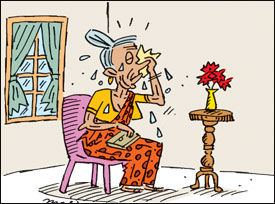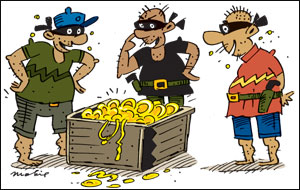|

by R. S. Karunaratne
Grammar patterns of 'All'
The word 'all' is a determiner meaning the complete amount or
quantity of something.
'All' is used with plural or uncountable nouns.
All men are mortal.
She has done all her homework.
|

The old woman wept all day.
|
All fish is rotten.
All the girls participated in the concert.
All kinds of people travel by bus.
'All' is used to say something about
people or things viewed as a group or set.
All the items for sale are half price.
The interview board rejected all the applications.
We are going to polish all the furniture.
All the old boys attended the party.
All the books were sold out.
'All' is used to say something about
one thing in its entirely.
I couldn't read all the book.
Grandfather read all the newspaper.
All my body is aching.
Why didn't you eat all your lunch?
'All' can be used to include every
person.
Can all of us go in this car?
Father has brought gifts for all of us.
|

They all lived in a caravan! |
'All' is used to emphasize that
everyone or everything is included.
They all lived in a caravan!
The beggars all stood in a quare to receive food.
The trip was exciting; I enjoyed it all.
'All' can be used to indicate that
only one thing exists or necessary.
All I need is money.
All you want can be found there.
'All' is used to emphasize
completeness.
She sat all alone on the beach.
Tell me all about your trip to India.
'All' can be used with certain time
expressions.
The old woman wept all day.
We kept vigil all night.
The students cleaned the classroom all morning.
We never have rain all year round.
Shakespeare was the greatest dramatist of
all time.
'All' is used in set phrases.
Are you angry with me?
Not at all.
Could I use your phone?
By all means.
All in all, it was a good
film.
All of a sudden, somebody
snatched my bag.
For all your faults, I
still like you.
First of all, let me
introduce the cast.
It rained all the time we
were in Kandy.
She was all smiles when I
saw her.
It doesn't sound all that good.
I met my old friend yesterday, but
that's all over now.
You can buy anything you want, it's
all the same to me.
Brush up your
English
English, like any other subject, has to be studied and practised from
time to time in order to use it effectively.
Study the following words and phrases and try to use them in your
speech and writing.
* Beside / Besides
'Beside' is a preposition that means at the side of somebody or
something.
She always sits beside her sister.
'Besides' is a preposition that means in addition to somebody or
something.
Besides meals, the pilgrims carried bottles of water.
* Past / Passed
'Past' can be used as a noun, adjective, preposition or adverb.
They always think of their prosperous past. (Noun)
The past month has been a difficult one for her. (Adjective)
It was past midnight when we returned home. (Preposition)
Sena walked past her. (Adverb)
'Passed' is the past tense of 'pass'.
Menu passed the exam with flying colours.
* All right / Alright
'All right' means as desired or satisfactory.
Are you all right in your new job?
'Alright' is informal and non-standard.
* Reason
'Reason' is usually followed by 'that' not 'because'.
I did not accept the offer of employment for the simple reason that
the salary was low.
[Spelling rules]
Rule
When we add 'ing' to some verbs we double the last letter.
- Sanath was batting
when it started to rain.
- William is good at chipping
wood.
- A small crowd of spectators started
clapping the performers.
- Two men were arrested for
cutting down a jak tree.
The company is
trying to reduce the running
costs.
Starters:
Use action
words
The English language is rich in words. As it borrows words from other
languages such as Latin, Greek, French and German, English has a large
vocabulary running into about 500,000 words.
When you use action words your writing becomes readable and
interesting. Look at the following sentences and try to replace the
underlined words with action words.
. Joe loves to play the violin, and Rani
goes to her lessons every
Sunday.
. The robbers found a box
full of jewellery.
|

They opened the box and gazed
at the jewellery. |
. They opened the box and looked
at the jewellery.
. One robber put some gold
bangles in his pocket.
. The robbers then talked
about what to do with the jewellery.
. Then they hid the box of
jewellery in a bush.
. The robbers went towards
the jeep.
Let's put some action words now.
. Joe loves to play the violin, and Rani rushed to her lessons every
Sunday.
. The robbers discovered a
box full of jewellery.
. They opened the box and gazed
at the jewellery.
. One robber sneaked some
gold bangles and put them in his pocket.
. The robbers then discussed
what to do with the jewellery.
. Then they concealed the
box of jewellery in a bush.
. The robbers rushed
towards the jeep.
You will find that the action words add colour to the sentences.
Activity
Improve the following sentences by replacing the underlined words
with action words.
1. At the library, students read
many things about dinosaurs.
2. Firefighters use
chemicals to put out a fire.
3. Policemen went to
control the mob.
4. He saved a drowning
man.
5. Once we saw water coming
out of a big tank. |

